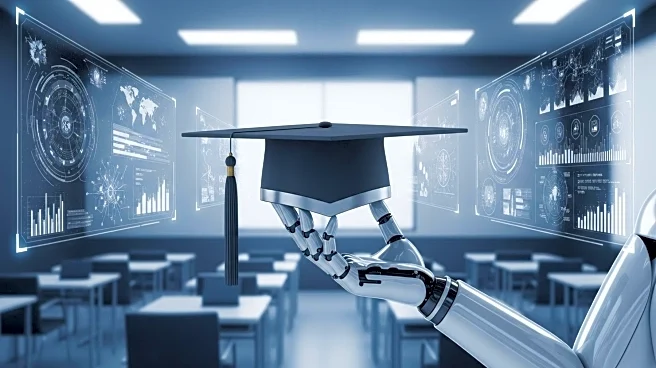What's Happening?
The integration of artificial intelligence (AI) in higher education is prompting significant changes in faculty work, as discussed in a recent article. AI tools are being utilized to enhance various aspects of academic tasks, such as drafting announcements, reformatting rubrics, and summarizing student feedback. These tools are designed to assist faculty by speeding up routine tasks, allowing educators to focus more on intellectual and creative work. The article highlights five cognitive tasks—perceiving, understanding, reasoning, executing, and creating—that AI can support in the academic environment. Faculty are encouraged to view AI as a partner in their work, helping to extend their capabilities rather than replace them. The discussion emphasizes the importance of understanding how AI can fit into existing educational frameworks and enhance the teaching and learning experience.
Why It's Important?
The adoption of AI in higher education is significant as it has the potential to transform how faculty manage their workload and engage with students. By automating routine tasks, AI allows educators to dedicate more time to critical thinking, creativity, and personalized student interactions. This shift could lead to improved educational outcomes, as faculty can focus on developing innovative teaching methods and providing more tailored support to students. Additionally, the use of AI in education can help institutions streamline operations and improve efficiency, ultimately benefiting both educators and students. However, it also raises questions about the role of educators and the need for ongoing training to effectively integrate AI into academic practices.
What's Next?
As AI continues to be integrated into higher education, institutions may need to develop strategies for training faculty to effectively use these tools. This could involve workshops, seminars, and resources to help educators understand the capabilities and limitations of AI. Additionally, there may be a need for ongoing research to assess the impact of AI on educational outcomes and to identify best practices for its use in academia. Stakeholders, including educational leaders and policymakers, will likely play a crucial role in shaping the future of AI in education, ensuring that it enhances rather than detracts from the teaching and learning experience.
Beyond the Headlines
The integration of AI in higher education also presents ethical considerations, such as data privacy and the potential for bias in AI algorithms. Institutions will need to address these issues to ensure that AI tools are used responsibly and equitably. Furthermore, the cultural shift towards AI-assisted education may require a reevaluation of traditional teaching roles and the value placed on human interaction in the learning process. As AI becomes more prevalent, educators and institutions will need to balance technological innovation with the preservation of humanistic values in education.









